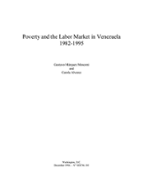Poverty and the Labor Market in Venezuela: 1982-1995
Date
Dec 1996
The purpose of this paper is to describe the performance of the Venezuelan labor market between 1982 and 1995, and to analyze its impact on the evolution of poverty. This time period is one wherein Venezuela suffered from the consequences of both changes in the international financial market conditions, and a sustained deterioration of economic management. Growth and inflation were highly volatile, real wages fell in a sustained way, and poverty increased dramatically. The authors develop the idea that the main labor problem in Venezuela was the decrease is falling real wages, not unemployment, and explore the labor market through the use of conceptual framework derived from segmented labor market models such as the Harris-Todaro model.



